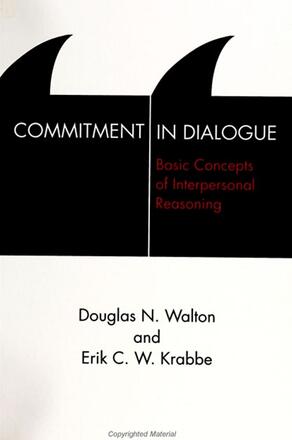
Commitment in Dialogue
Basic Concepts of Interpersonal Reasoning
Alternative formats available from:
Develops a logical analysis of dialogue in which two or more parties attempt to advance their own interests. It includes a classification of the major types of dialogues and a discussion of several important informal fallacies.
Description
This book develops a logical analysis of dialogue in which two or more parties attempt to advance their own interests. It includes a classification of the major types of dialogues and a discussion of several important informal fallacies. The authors define the concept of commitment in a way that makes it useful in evaluating arguments. In traditional logic, a proposition is either true or false, and that is the end of it. In this new framework, an arguer can be held to his or her commitments in some cases, but in other cases, he or she can retract them without violating any rule of the dialogue. Commitment in Dialogue studies the conditions under which commitments should be held or may be retracted within an argument.
An extensive case study of a discussion in medical ethics is used to bring together two traditions or schools of thought that had not been integrated previously—the rigorous Lorenzen school of formal logic, and the more permissive Hamblin-style dialogue. It introduces these methods of evaluation and offers guidelines for analyzing the text of discourse.
The book could be used in both intermediate and advanced courses in informal logic, argumentation, and critical thinking, but it is accessible to the reader with no background in these fields as well. Each chapter is summarized, and additional problems to be solved are presented.
Douglas N. Walton is Professor in the Department of Philosophy at the University of Winnipeg. He is the author of Plausible Argument in Everyday Conversation, also published by SUNY Press and The Place of Emotion in Argument. Erik C. W. Krabbe is Associate Professor of Logic and Argumentation Theory in the Philosophy Department at Groningen University. He is the coauthor of From Axiom to Dialogue: A Philosophical Study of Logics and Argumentation, and coeditor of Logic and Political Culture: Proceedings of the Colloquium 'Logic and Politics', Amsterdam 19-22 February 1990 and Empirical Logic and Public Debate: Essays in Honour of Else M. Barth.